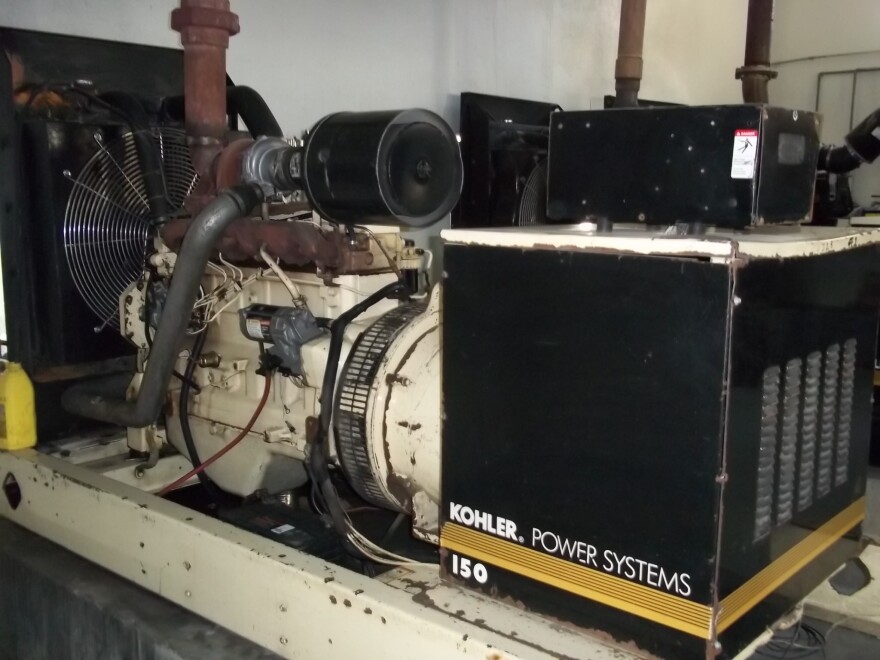“Up here on this roof there’s nine panels that kind of face southwest. All my big heavy afternoon loads like air conditioning, it lets me run those loads clear to sundown without tapping into the battery,” says Wiles.
Craig Wiles has lived off the grid since he and his wife moved to rural Wright County, Missouri in 1997. It was too expensive to run a power line the one-mile needed to reach his property. So given his knowledge of renewables, he turned what was once a barn into a multi bed and bath home that is run entirely off of solar energy.
REPORTER: How many panels do you currently have here?
WILES: I have 24. And I have 12 more that I’m gonna put up… Yeah we’re all solar.
Wiles used to own a solar business. These days he serves as a pastor.
A while back his expertise in renewable energy was called upon by friend Richard Hobbs, who for over 20 years has been active in Haiti through Sonlight Ministries. The organization enrolls nearly 600 total students at its Christian, English-immersion K-12 school and Bible college in Port-de-Paix. But the costs for operating these classroom buildings, which also have dedicated residential space, are extremely high.

“I think it’s well over $250,000 a year they have spent on diesel fuel. They have three huge generators. Two of ‘em runs I think 20 hours a day and there’s always one that’s down for repairs or something,” Hobb said.
Haiti is one of the poorest countries in the world. And among the many services it’s lacking is a viable energy source. Those that can afford them depend on gas generators. After visiting Haiti to assess the infrastructure four years ago, Wiles determined the best approach for Sonlight Ministries is to create a micro-grid that’s generator based but utilizes solar.
“If you put up solar here in the United States where electricity in our neck of the woods is about 10 cents a kilowatt hour, the payback on that – for it to pay itself off – is about 10 years… But in Haiti, where their cost of electricity’s roughly 50 cents a kilowatt hour, the payback is two years.”
Once the panels are installed, the solar power created will reduce generator reliance from burning nine gallons of diesel fuel an hour to three, saving thousands each year.
So it was a no brainer for Hobbs and Wiles to secure a 240-solar panel container, which was shipped from Miami to Port-de-Paix in May 2014. But in a third world country like Haiti the logistics of getting the shipment through border security and installed is another hurdle.
“The corruption, the delays of shipping... How long did it take us to get that container – six months? Wiles asks Hobbs.
“It was a long, long time,” responds Hobbs.
Wiles continues, “I mean you just couldn’t get it to move. It was like somebody needed another $30 for this fee and that fee. It went right in their pocket, you know it did.”

Crews have just now reached the point of installation, with enough mounting racks to install half of the panels they have in stock. Hobbs estimates they’ve spent close to $70,000 on the project so far, and another $40,000 is needed to secure and install the remaining parts.
Hobbs says most of the funding to date has been private, citing a few individuals and organizations such as churches. Hobbs declined to say how much he’d personally contributed, but his efforts appear significant.
“As far as I know he funded it himself,” say Alexander of Hobbs’ commitment to the project.
That’s Roger Alexander, the executive director of Sonlight Ministries, based in Evansville, Indiana. He’s currently stateside tending to an illness in his family.
“We’re just grateful for Richard and Craig and all the help that we get in doing that. And we have some people now that are getting excited here about coming down and helping to get ‘em going,” he said.
Over the years, hundreds have graduated from Alexander’s Sonlight Academy and Bible college. They’ve gone into mission work, translation services, the military, and become doctors. Now, Alexander believes exposure to renewable energy efforts will spark a new interest among students.
“It was hard for them to see or understand some of the things that we were capable of doing. And [now] there’s so many things they wanna [learn]. Would you teach us mechanics, would you teach us electric, and so many of those things,” Alexander said.
“I guess our hope is they’ll be in government someday,” says Richard Hobbs. “And then they’ll shine the light and say, ‘Yeah we can do better in Haiti.’”
Craig Wiles, the southern Missouri pastor whose home is completely dependent upon renewables, believes solar integration in Haiti could offer more opportunities for adults there.
“The studies show that if you put one solar panel on that school building so that you can just have a light after dark and do an adult literacy program – after dark when they can’t be in the field [working] anyway – you’ll double the literacy rate in that village in one year. With one solar panel. It really can be that easy and that significant.”
He adds that it all comes back to education, which is being absorbed – much like the sun’s rays – to maximize full potential.
The 120 solar panels currently ready for installation at Sonlight Ministries should be completed by March.




